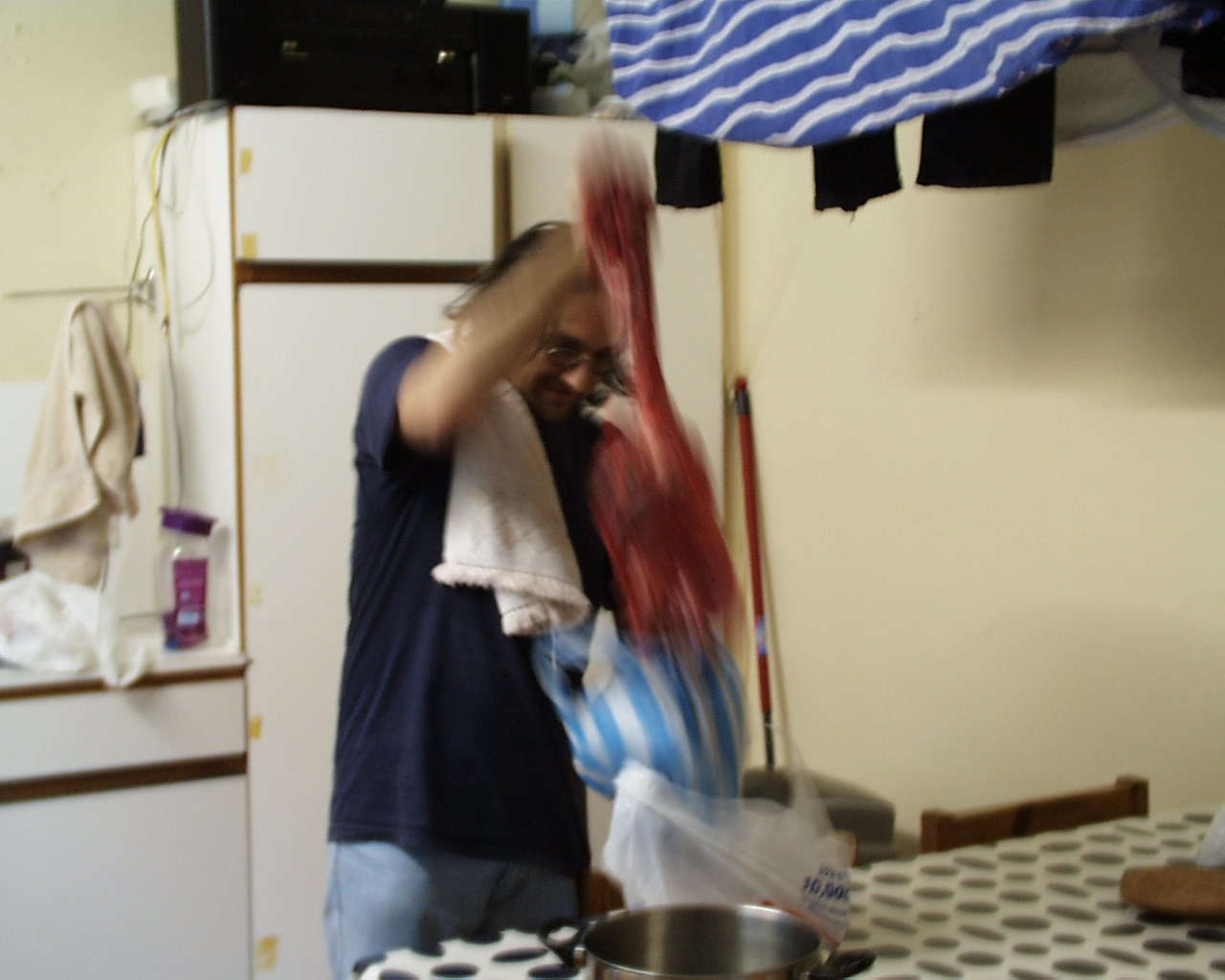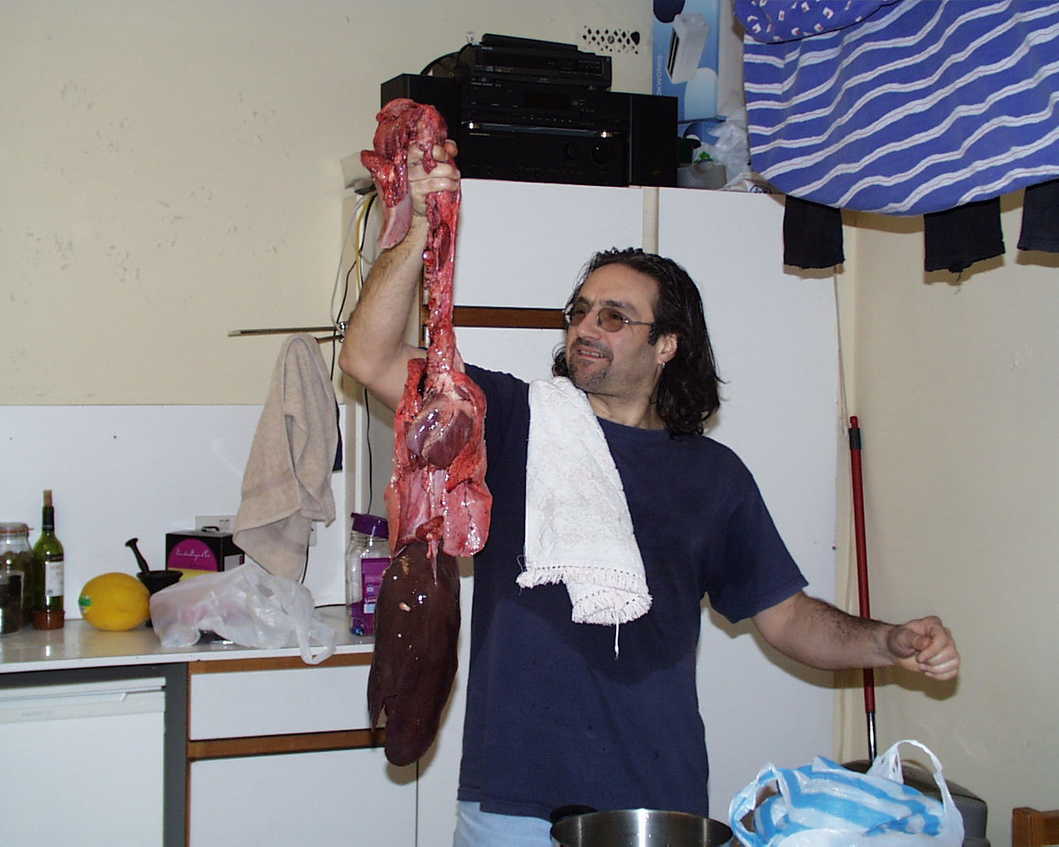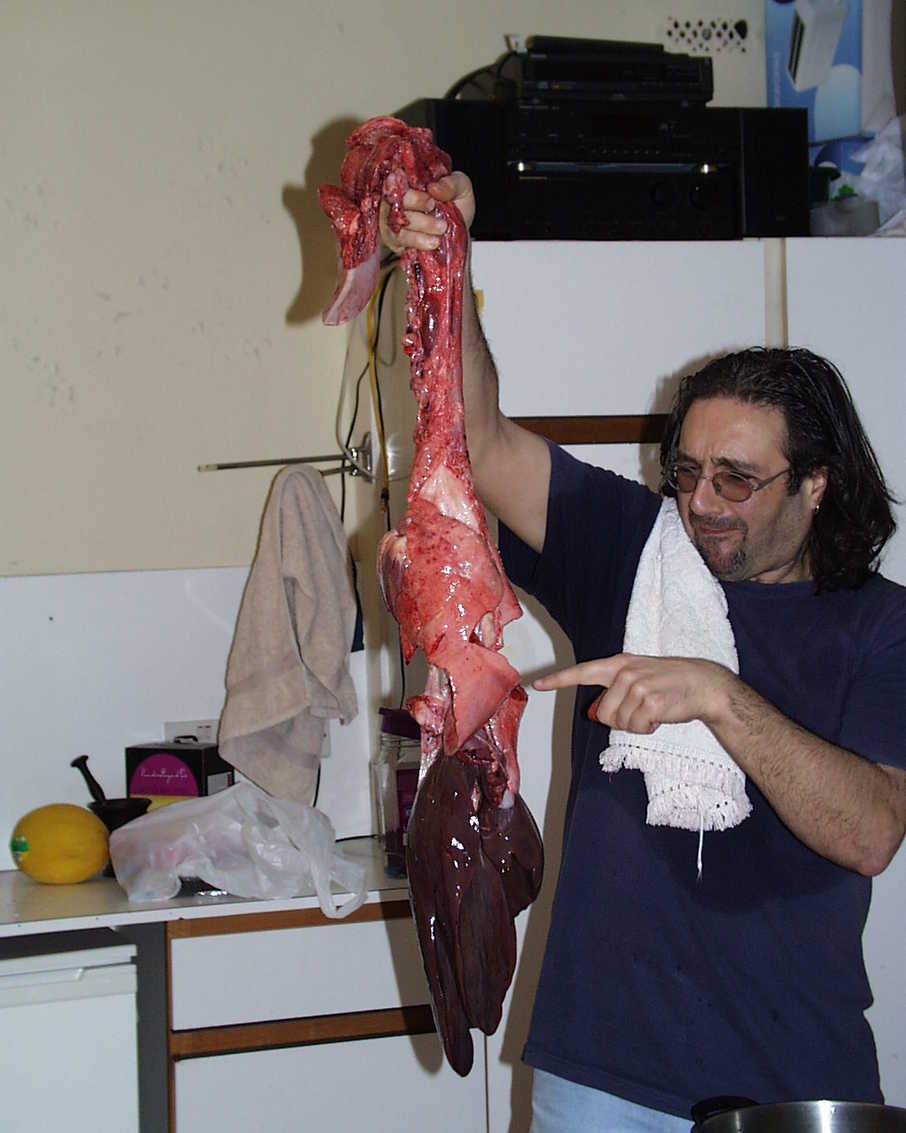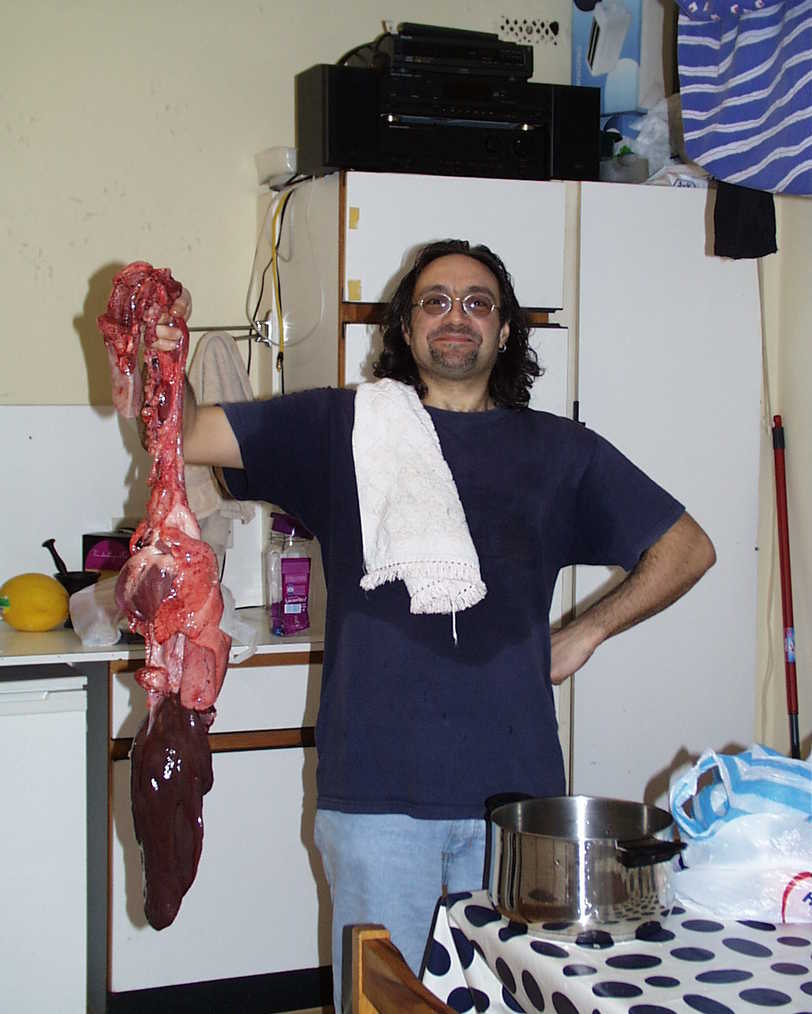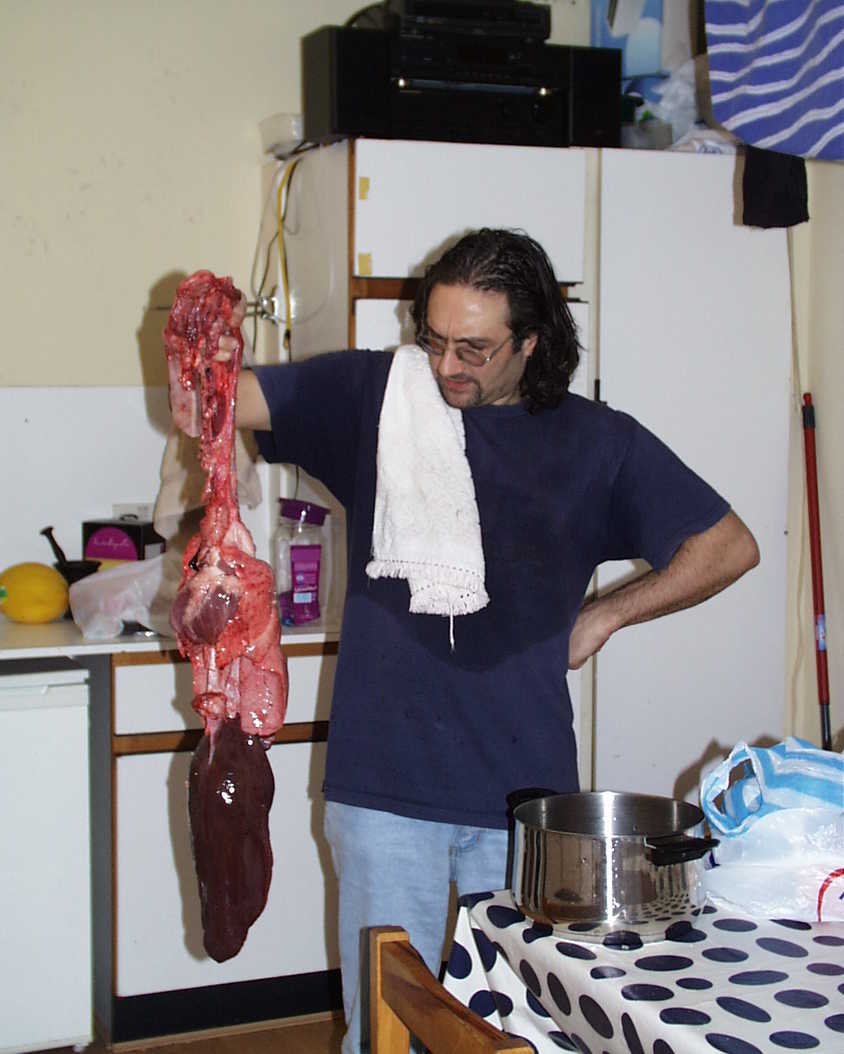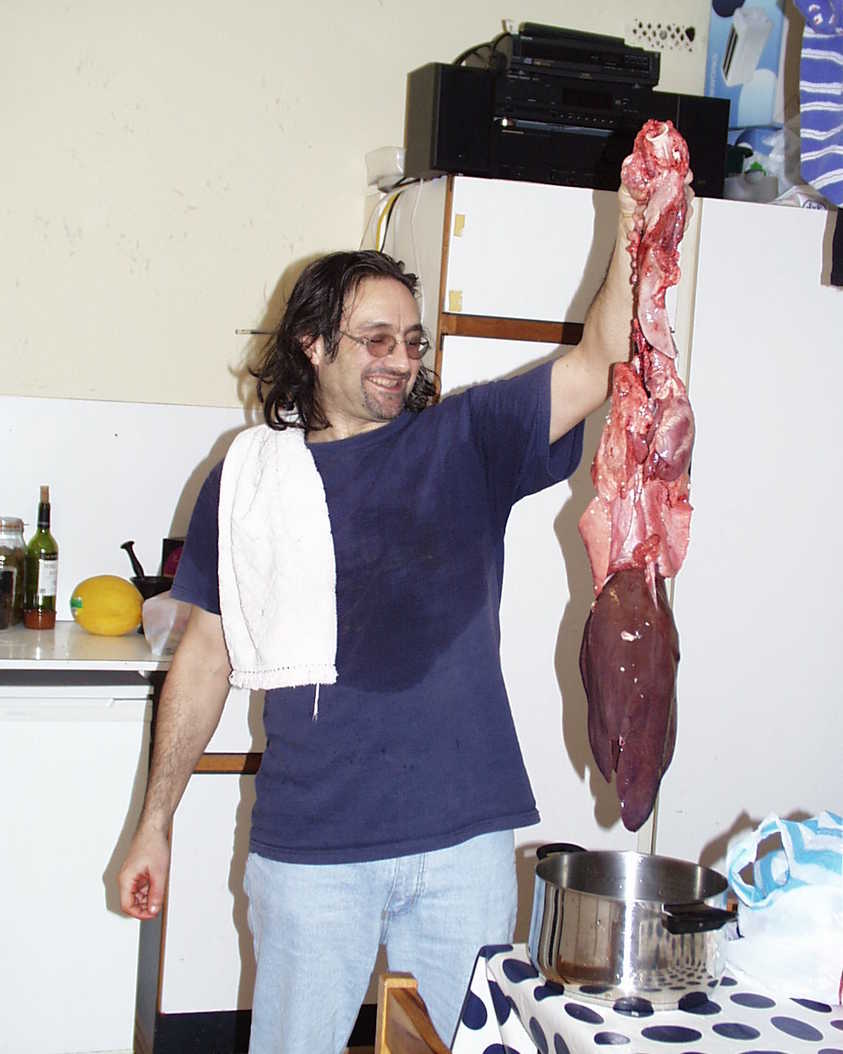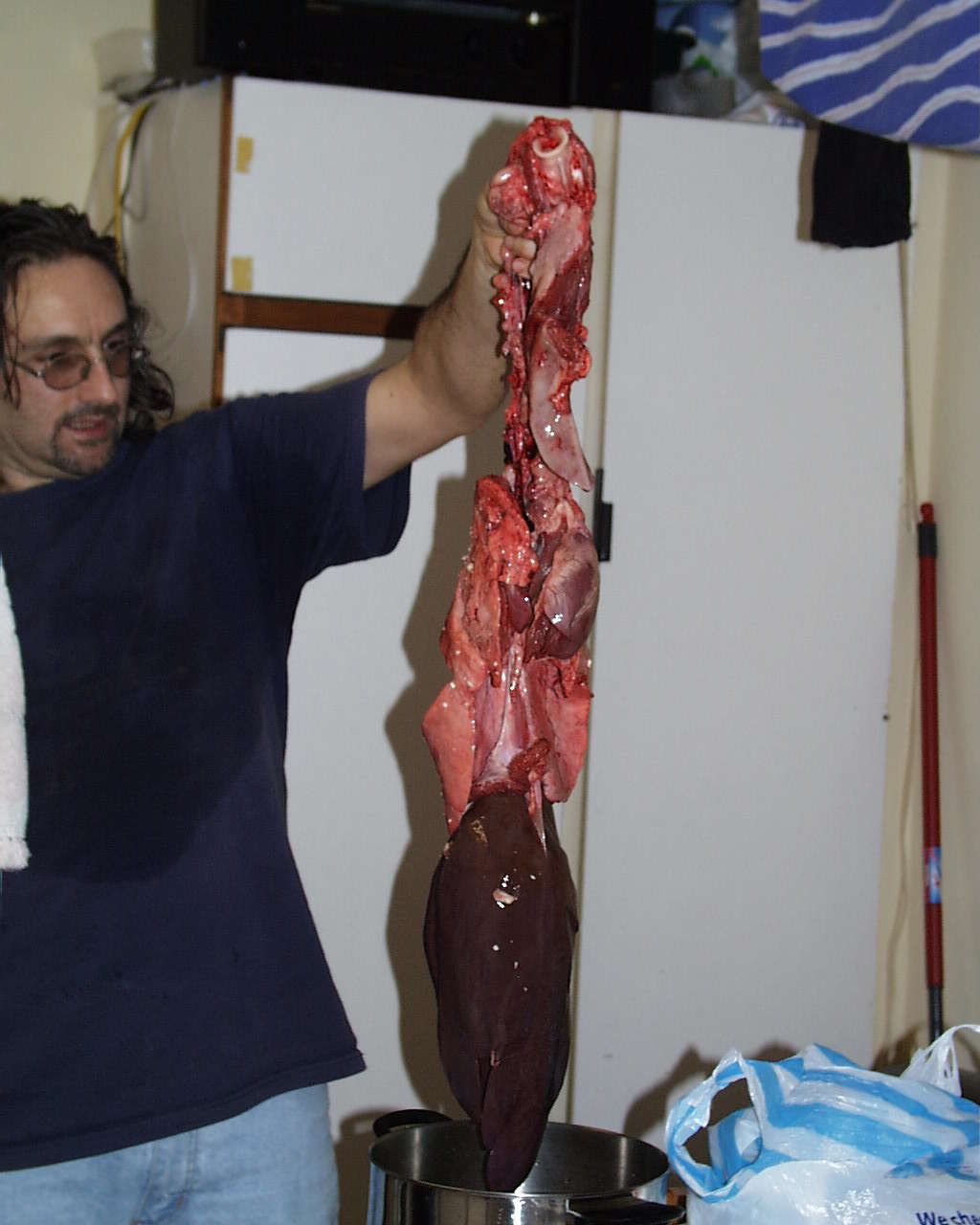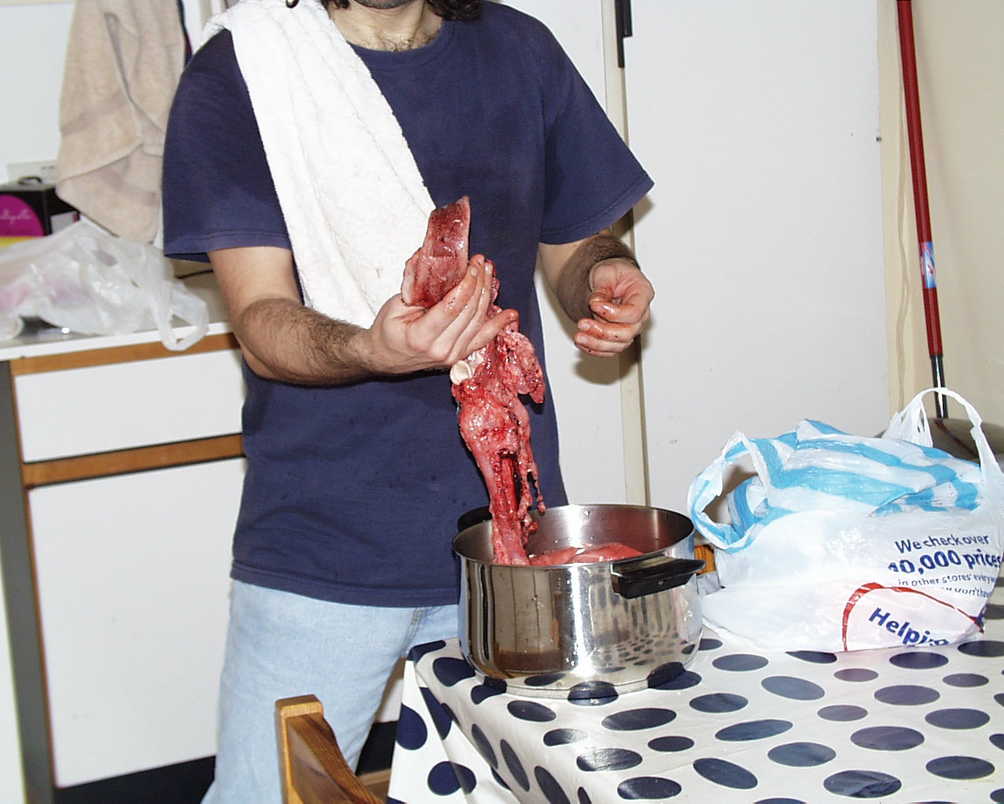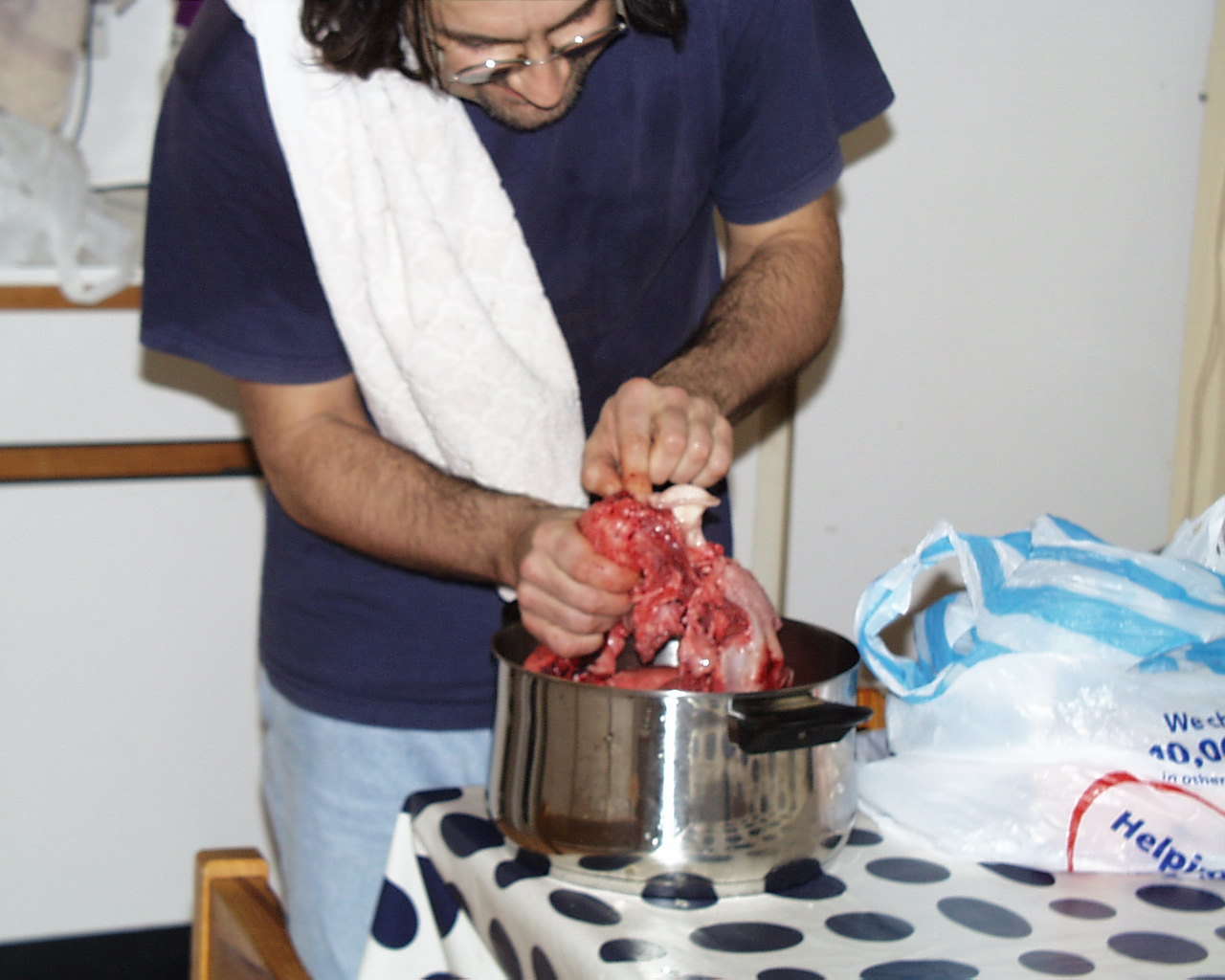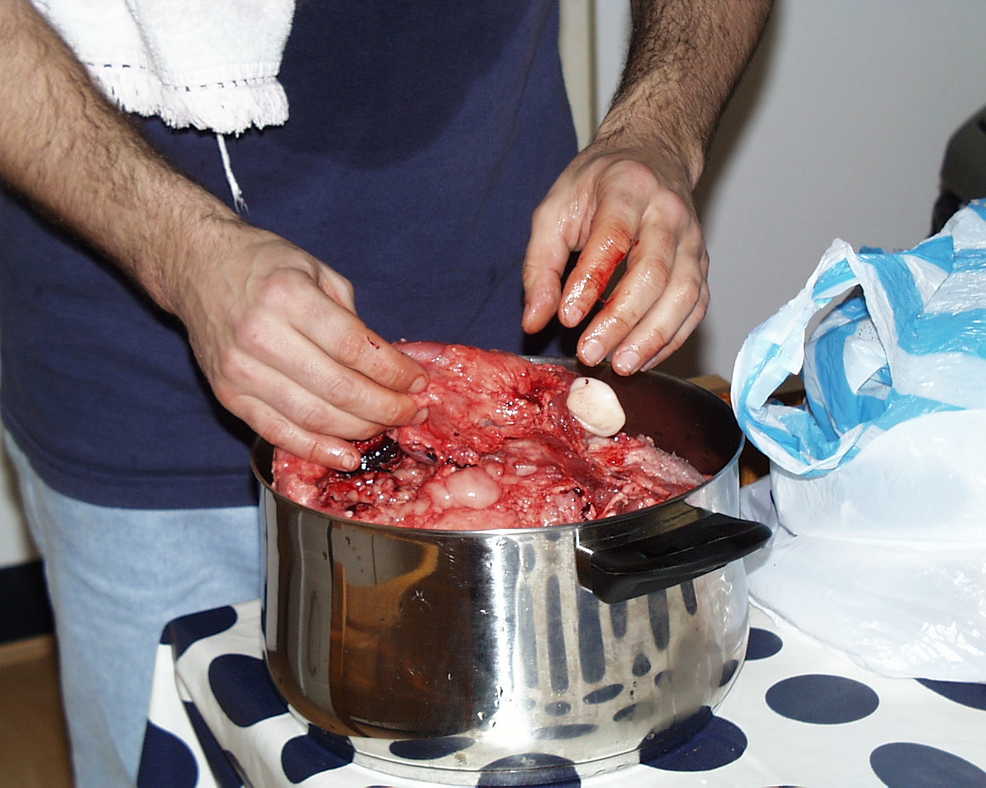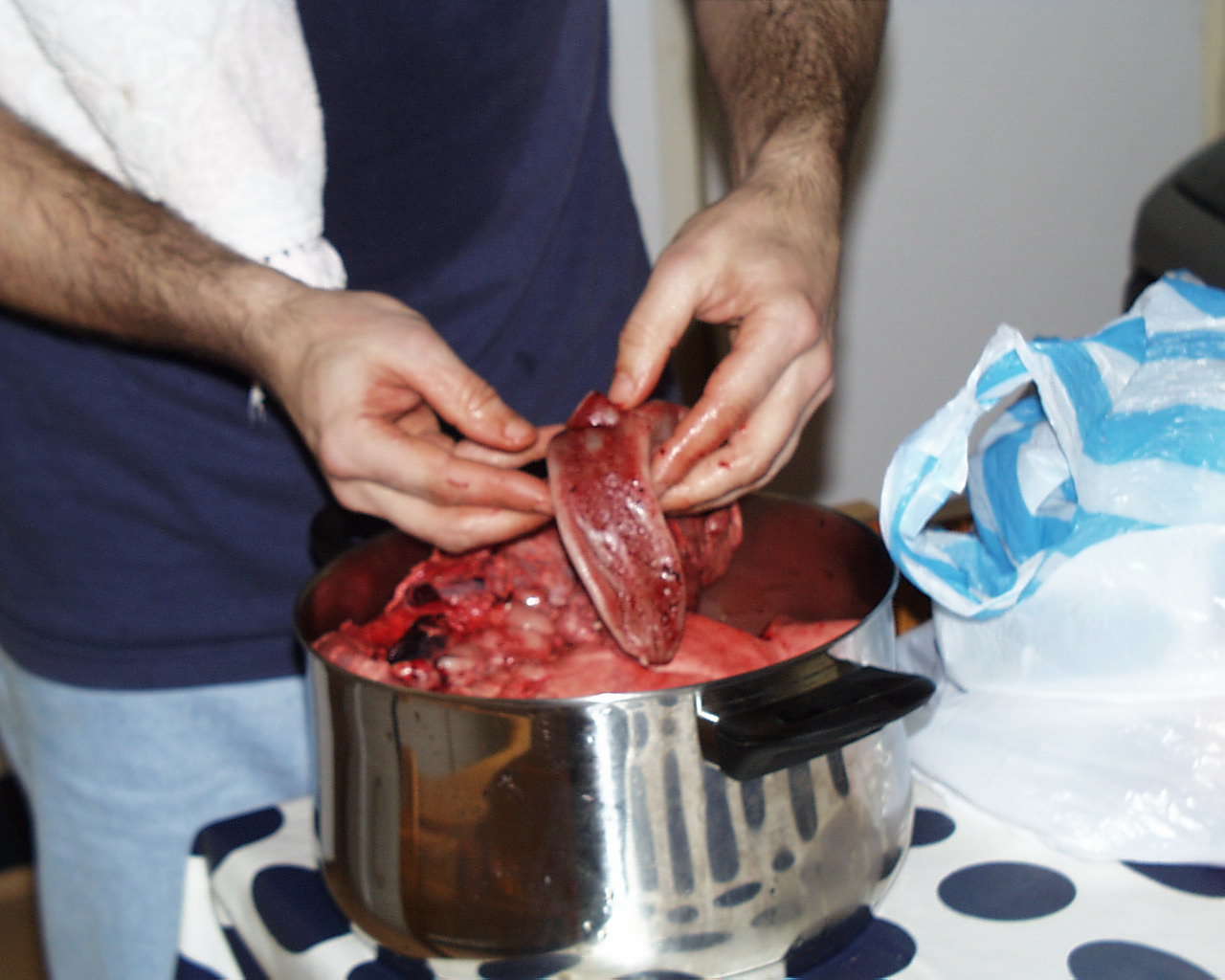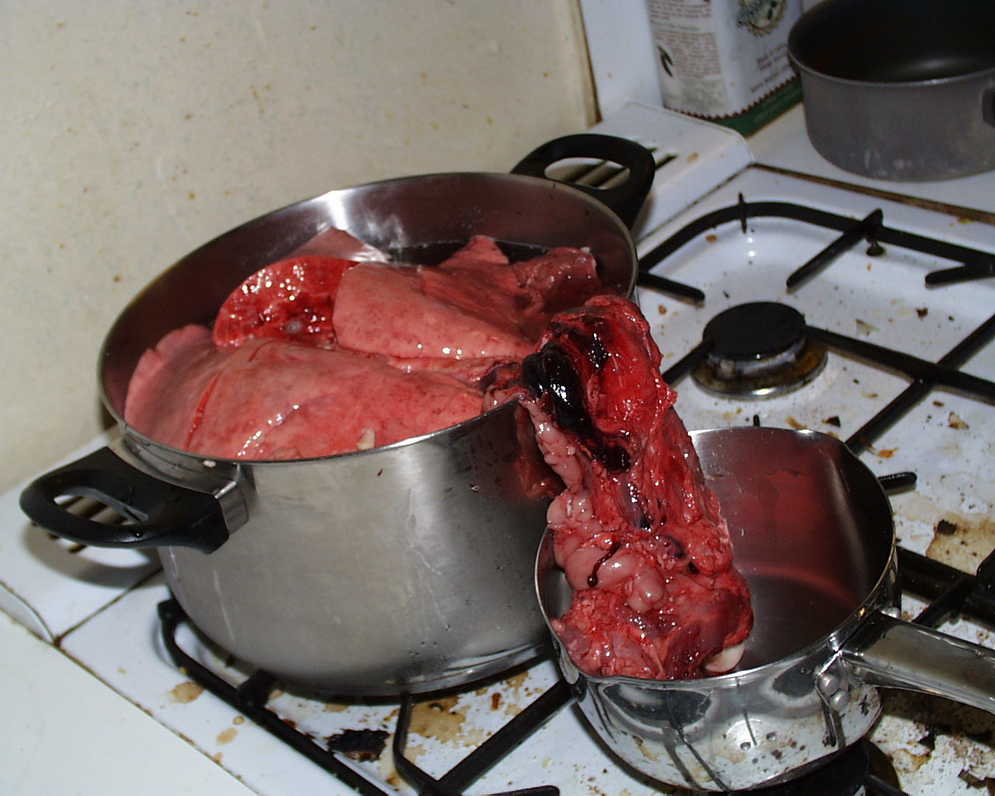"It's offaly gud"
Haggis
main meat
Ingredients
1 sheep pluck
(liver about 2lb, heart about ½lb, lungs ½lb kidney and the tongue if you like ).
1lb kidney suet (fat).
2 ox ceca/bungs (soaked overnight).
3/4 lb pinhead oatmeal (toasted).
cup pearl barley (cooked).
1 very large onion, or two medium (chopped).
half head of garlic (minced).
spices:
Drambuie sauce:
Drambuie
double cream
Method
(liver about 2lb, heart about ½lb, lungs ½lb kidney and the tongue if you like ).
1lb kidney suet (fat).
2 ox ceca/bungs (soaked overnight).
3/4 lb pinhead oatmeal (toasted).
cup pearl barley (cooked).
1 very large onion, or two medium (chopped).
half head of garlic (minced).
spices:
mace
nutmeg
allspice
cayenne pepper
salt
pepper (black and coloured)
nutmeg
allspice
cayenne pepper
salt
pepper (black and coloured)
Drambuie sauce:
Drambuie
double cream
I got hold of two ox ceca,
which are apparently that part of an ox intestine which leads to the appendix and are shaped like enormous silk stockings.
These I soaked in water overnight making sure the water filled them up by pouring the water inside too.
Since they were already heavily salted i didn't need to salt the water.
These were a bit hard to find, one butcher told me they're not allowed to use sheep's stomachs any more, but they only cost £3.
I prepared a cup of (whole) pearl barley by boiling in salted water for 45 minutes, or until tender. I used twice the volume of water to barley. You could probably season the water (I used a piece of mace) or use stock.
The pluck is what you would imagine you would get if you stuck your hand down the sheep's neck, seized it's windpipe, and pulled firmly. Really firmly. This consists of the heart, liver (surprisingly large) and the lungs (also known as lights). The tongue was also attached so I included that too. The whole lot cost me a fiver, and the butcher threw in the oatmeal.
I stuck the pluck into a large pan, covered it with water and simmered for 30 mins. There's a problem with keeping the lungs in the pan since they tend to inflate and float off. I tried the idea I had read of dangling the windpipe over the edge of the pan to siphon off undesirable liqueur from the lungs. This seemed to have no effect. Meanwhile I started prepared the other ingredients.
I toasted about 3/4 lb of pinhead oatmeal (looks like small gravel) in a skillet on the oven top until golden. Probably about 3 cups. This takes quite a while, and I had to do it in about four batches since the pan was small. The onion was chopped, though not too finely (about ½cm dice), and the garlic cloves minced.
I used whole mace, allspice and peppercorns (mixed colours, and black). I estimated what of each of these (one of each type of peppercorn) would be required to produce a teaspoon of ground product and put them into a spice grinder with a teaspoon of salt. So I ended up with about five teaspoons of this mix. I grated in about a teaspoon of nutmeg, a couple of generous teaspoons of cayenne pepper, and probably another spoon of salt.
I chopped the kidney suet (I suspect this was cow though) medium finely - I suppose you could grate it too.
When the offal was simmered (don't overdo this - it just needs to firm up the offal to make it easier to handle) I hand-grated the liver using the largest grade on one of those usual 'block of cheese' graters. I pulled out the tubules as I found them, and avoided grating the rather dried-out skin. When finished I picked over the grated liver by hand and took out any rubbery or gristly bits I missed. The liver is huge so this took half an hour and there was tons of it.
I skinned the tongue (some of which just scraped off) then sliced the remaining tongue meat, and the heart. I picked through the cooked lungs but there was surprisingly little actual meat. Most of the lungs consist of capillaries which are rather gristly, and need to be discarded. I then liquidized the tongue, heart and selected lung pieces along with as much of the boiling liqueur as necessary. This produced a nice smooth offal mousse which I mixed with the liver. To this I added the toasted oatmeal, cooked barley, chopped onion, chopped suet, garlic and spices and mixed it together. Since the size of the pluck is going to vary I suggest you stop if you seem to be adding too much of any ingredient. I added enough boiling liqueur to make the mixture cohere without being too sticky. At this point it starts to smell like haggis. This mixture is then stuffed into the ox ceca. I used them with the veiny side out, which is how they arrived. About half the mix in each cecum was quite enough, and made two enormous haggis. I squeezed any air out of the cecum, left some extra cecum for expansion, then tied them off in a knot and cut off the extra.
The haggis was simmered for three hours, they will need pricking with a needle near to the start since they swell with any left-in air alarmingly. Unfortunately, both my haggis split open after about 2 hours of cooking. I figure I needed to allow even more room for expansion by leaving a longer neck. Perhaps a third or even half extra. Perhaps it would be better just to avoid stuffing them so full, since it seemed the sideways expansion was the problem. When they split I just decanted the haggis flesh (still quite firm) into aluminium foil, wrapped them tightly, and then continued their cooking (a tricky process, given their size and temperature). This has happened to me before with shop-bought haggis, so perhaps it's best to wrap them in tin foil from the start just in case.
I made a normal gravy using the reduced pluck boiling liqueur and we also made Drambuie sauce by heating up double cream and stirring in a whisky and honey mix (since we didn't have Drambuie). The sauce went really well with the haggis.
You will also need champit tatties made from baked King Edwards or Maris Piper, baked heads of garlic, a dash of cream, some chopped chives, a grating of nutmeg, salt and vast quantities of butter. Mashed neeps made from mashed swede and carrots (60/40), some grated fresh ginger, a dash of orange juice or Grand Marnier, pepper, and of course generous amounts of butter.
I prepared a cup of (whole) pearl barley by boiling in salted water for 45 minutes, or until tender. I used twice the volume of water to barley. You could probably season the water (I used a piece of mace) or use stock.
The pluck is what you would imagine you would get if you stuck your hand down the sheep's neck, seized it's windpipe, and pulled firmly. Really firmly. This consists of the heart, liver (surprisingly large) and the lungs (also known as lights). The tongue was also attached so I included that too. The whole lot cost me a fiver, and the butcher threw in the oatmeal.
I stuck the pluck into a large pan, covered it with water and simmered for 30 mins. There's a problem with keeping the lungs in the pan since they tend to inflate and float off. I tried the idea I had read of dangling the windpipe over the edge of the pan to siphon off undesirable liqueur from the lungs. This seemed to have no effect. Meanwhile I started prepared the other ingredients.
I toasted about 3/4 lb of pinhead oatmeal (looks like small gravel) in a skillet on the oven top until golden. Probably about 3 cups. This takes quite a while, and I had to do it in about four batches since the pan was small. The onion was chopped, though not too finely (about ½cm dice), and the garlic cloves minced.
I used whole mace, allspice and peppercorns (mixed colours, and black). I estimated what of each of these (one of each type of peppercorn) would be required to produce a teaspoon of ground product and put them into a spice grinder with a teaspoon of salt. So I ended up with about five teaspoons of this mix. I grated in about a teaspoon of nutmeg, a couple of generous teaspoons of cayenne pepper, and probably another spoon of salt.
I chopped the kidney suet (I suspect this was cow though) medium finely - I suppose you could grate it too.
When the offal was simmered (don't overdo this - it just needs to firm up the offal to make it easier to handle) I hand-grated the liver using the largest grade on one of those usual 'block of cheese' graters. I pulled out the tubules as I found them, and avoided grating the rather dried-out skin. When finished I picked over the grated liver by hand and took out any rubbery or gristly bits I missed. The liver is huge so this took half an hour and there was tons of it.
I skinned the tongue (some of which just scraped off) then sliced the remaining tongue meat, and the heart. I picked through the cooked lungs but there was surprisingly little actual meat. Most of the lungs consist of capillaries which are rather gristly, and need to be discarded. I then liquidized the tongue, heart and selected lung pieces along with as much of the boiling liqueur as necessary. This produced a nice smooth offal mousse which I mixed with the liver. To this I added the toasted oatmeal, cooked barley, chopped onion, chopped suet, garlic and spices and mixed it together. Since the size of the pluck is going to vary I suggest you stop if you seem to be adding too much of any ingredient. I added enough boiling liqueur to make the mixture cohere without being too sticky. At this point it starts to smell like haggis. This mixture is then stuffed into the ox ceca. I used them with the veiny side out, which is how they arrived. About half the mix in each cecum was quite enough, and made two enormous haggis. I squeezed any air out of the cecum, left some extra cecum for expansion, then tied them off in a knot and cut off the extra.
The haggis was simmered for three hours, they will need pricking with a needle near to the start since they swell with any left-in air alarmingly. Unfortunately, both my haggis split open after about 2 hours of cooking. I figure I needed to allow even more room for expansion by leaving a longer neck. Perhaps a third or even half extra. Perhaps it would be better just to avoid stuffing them so full, since it seemed the sideways expansion was the problem. When they split I just decanted the haggis flesh (still quite firm) into aluminium foil, wrapped them tightly, and then continued their cooking (a tricky process, given their size and temperature). This has happened to me before with shop-bought haggis, so perhaps it's best to wrap them in tin foil from the start just in case.
I made a normal gravy using the reduced pluck boiling liqueur and we also made Drambuie sauce by heating up double cream and stirring in a whisky and honey mix (since we didn't have Drambuie). The sauce went really well with the haggis.
You will also need champit tatties made from baked King Edwards or Maris Piper, baked heads of garlic, a dash of cream, some chopped chives, a grating of nutmeg, salt and vast quantities of butter. Mashed neeps made from mashed swede and carrots (60/40), some grated fresh ginger, a dash of orange juice or Grand Marnier, pepper, and of course generous amounts of butter.
